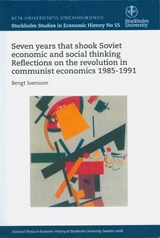

Seven years that shook Soviet economic and social thinking Reflections on the revolution in communist economics 1985–1991
- Utgiven: 2008
- ISBN: 9789186071080
- Sidor: 174 st
- Förlag: Acta Universitatis Stockholmiensis
- Format: Häftad
- Språk: Engelska
Om boken
Åtkomstkoder och digitalt tilläggsmaterial garanteras inte med begagnade böcker
Mer om Seven years that shook Soviet economic and social thinking Reflections on the revolution in communist economics 1985–1991 (2008)
I januari 2008 släpptes boken Seven years that shook Soviet economic and social thinking Reflections on the revolution in communist economics 1985–1991 skriven av Bengt Svensson. Den är skriven på engelska och består av 174 sidor. Förlaget bakom boken är Acta Universitatis Stockholmiensis.
Köp boken Seven years that shook Soviet economic and social thinking Reflections on the revolution in communist economics 1985–1991 på Studentapan och spara pengar.
Referera till Seven years that shook Soviet economic and social thinking Reflections on the revolution in communist economics 1985–1991
Harvard
Oxford
APA
Vancouver



















